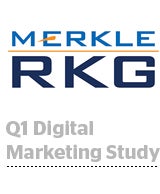 Merkle|RKG’s Digital Marketing Report, released this week, notes strong disparities between the display ad effectiveness and cost of rivals Google and Facebook.
Merkle|RKG’s Digital Marketing Report, released this week, notes strong disparities between the display ad effectiveness and cost of rivals Google and Facebook.
In short, Facebook drives conversion rates, but Google is among the cheapest on a CPC basis.
Though Google click growth dipped to 0.2% YoY, the Google Display Network (GDN) pulled 11% of all Google spend for advertisers that do display (compared to 6% this time last year). Retargeting and placements – identifying which websites to target – took the biggest share of spend on GDN.
“Advertisers are looking more than ever at prospecting and trying to reach new customers,” Andy Taylor, a senior research analyst at Merkle|RKG, told AdExchanger. “At the same time, audience retargeting is becoming more robust.”
“Facebook currently has greater targeting capabilities than Google, in terms of specific user information and allowing advertisers to act on that user information,” he added. “But advertisers are willing to pay more [on Facebook], especially knowing what types of traffic they’re getting.”
Contextual ads on GDN took 27% less ad spend than placement and retargeting ads, and showed a 33% lower average CPC.
“As retargeting ads tend to generate incremental sales at a higher rate than those targeted contextually to prospects, advertisers have been willing to spend more per click for that traffic,” explained the report.
Meanwhile, Facebook saw a 63% YoY increase in advertiser investment, including FBX and native ads. CPCs on Facebook grew 21% YoY.
Facebook had better conversion rates than GDN – in fact, Merkle found it had the highest revenue per click compared to GDN and others.
But GDN is about price. Clicks were 42% cheaper than those on Facebook. In fact, Facebook was the most expensive – other networks typically had 20% cheaper clicks than Facebook.
GDN ad impressions were 39% less expensive than on Facebook. But other display networks ranked 22% more expensive than on Facebook. Facebook is getting more expensive because of decreasing real estate as larger right hand rail ads limit the overall availability of impressions.
“GDN is still a big part of display budgets and it has grown,” said Taylor. “With the potential added capability of targeting specific email addresses and other CRM data, advertisers are probably going to allocate even more of their budgets there.”
“I don’t think we’re going to see Facebook spend slow down,” he added, “but I do think Facebook’s CPC and CPM are going to continue to rise relative to other display opportunities. I also think GDM is going to grow in importance, especially as a share of Google spend.”
As for what’s been dubbed Google’s “Mobilegeddon” – its search algorithm change that prioritizes mobile sites – Merkle|RKG found that 46% of Fortune 500 Companies and 29% of Internet Retailer top 500 firms could lose ground in Google’s search ranking (despite a handful of publishers excited about the change).
Those percentages represent the firms that had not received Google’s “mobile-friendly” designation as of early April, which matters to advertisers because mobile devices are 47% of Google’s total organic traffic.











